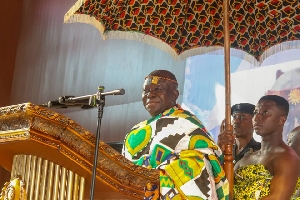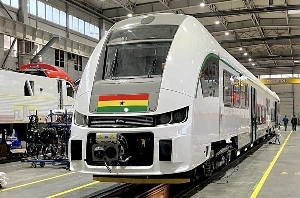- Home - News
- TWI News | TV
- Polls
- Year In Review
- News Archive
- Crime & Punishment
- Politics
- Regional
- Editorial
- Health
- Ghanaians Abroad
- Tabloid
- Africa
- Religion
- Election 2020
- Coronavirus
- News Videos | TV
- Photo Archives
- News Headlines
- Press Release
General News of Saturday, 10 May 2003
Source: Panafrican News Agency
Mobile phones evolve from status symbol to essential gadget
When Millicom Ghana Limited introduced mobile phones into Ghana in 1992, it was seen largely as a status symbol for the rich, recording 19,000 subscribers in that year alone.
More than 10 years on, there are four companies providing cell phone facilities and subscribers now number more than half a million, outstripping telephone lines by 2:1.
Total mobile lines are estimated at more than 531,000, while telephone lines are still around 240,000.
Millicom Ghana Limited operates both an analogue, which covers the whole country, and a GSM, which covers only Accra, Tema, Kumasi and Takoradi.
Celltell provides analogue facilities only in Accra and Tema, while state-owned Ghana Telecom and Spacefon provide GSM facilities. Ghana Telecom and Spacefon coverage is nationwide.
But access to mobile phone lines, especially Spacefon, is difficult for the public. With the four companies not cooperating effectively, the network is almost always jammed because of a shortage of cell stations.
The development of Ghana's telephone system has been one of the biggest headaches for successive governments.
With the country's population hitting almost 20 million, a mere 240,000 lines -- 2.9 lines per 100 persons -- is nothing to write home about. Even then, the telephone facilities are available mainly in the cities and towns.
The state-owned Ghana Telecom was privatised in 1996, with Telecom Malaysia acquiring 30 percent shares. Since then, the provision of wired lines has moved up progressively to more than 240,000 across the country, but reliability remains a problem.
The government recently abrogated the contract from Telecom Malaysia, triggering a political storm with Malaysia. It has signed a new agreement with Telenor of Norway to improve the system.
The cost of subscription to mobile phone is about 300,000 cedis (US$34), but that of the state-owned Ghana Telecom is scarce and is going on the black market for more than twice the amount.
The most advanced remains Spacefon, but it is the most difficult to access. It has international roaming and facilities to send e- mails.
The wired lines in several parts of the cities are choked, as residential development is faster than provision of telephones.
The busy tones, the clogged lines and the shortage of cell stations will live with Ghana for a while, but the popularity of mobile phones continues to increase.










